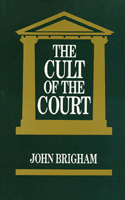![]()
![]() A fresh and innovative examination of the U.S. Supreme Court as the final arbiter of constitutional interpretation
A fresh and innovative examination of the U.S. Supreme Court as the final arbiter of constitutional interpretation![]()
![]()
![]()
![]() A fresh and innovative examination of the U.S. Supreme Court as the final arbiter of constitutional interpretation
A fresh and innovative examination of the U.S. Supreme Court as the final arbiter of constitutional interpretation![]()
![]()
 |
The Cult of the CourtJohn Brighampaper EAN: 978-0-87722-828-8 (ISBN: 0-87722-828-0) |
"The book offers a brilliant and sophisticated analysis of the place the Supreme Court has earned for itself in the American political system."
—C. Herman Pritchett
In recent years widespread attention has been focused on decisions handed down by the Supreme Court that grapple with passionate issues: integration, school prayer, abortion, affirmative action. The appointment of new justices is a highly charged political event although the Court is supposed to be "above" politics. Amidst the bicentennial celebration of the Constitution and almost daily reports of major confrontations awaiting the highest court�s judicial review, John Brigham presents a fresh and innovative examination of the U.S. Supreme Court as the final arbiter of constitutional interpretation.
Drawing on philosophy and anthropology, The Cult of the Court offers a social scientific investigation of an institution whose authority has come to be taken for granted. The author emphasizes that the Court is an institution and that its authority is founded less in the claim of legal expertise than in hierarchical finality—the assertion of political will, not of legal judgment. He shows how the Court has supplanted the Constitution as the authority in our political world and that what makes legal "sense" is affected by these factors of institutionalization, bureaucratization, and court-dominated constitutionalism.
Excerpt available at www.temple.edu/tempress
"Brigham's analysis of the Supreme Court is original and incisive. He focuses on the spectacular growth in the Court's power and prestige over the past two centuries, exploring the politics of institution building with sensitivity and finesse."
—Doris Marie Provine, Syracuse University
"[This book] constructs an original framework to explore the legal, political, and social influences that have shaped modern judicial authority. Brigham rightly argues that future research needs to explore further the roots of modern judicial authority as well as current challenges to the Court. He provides us with a powerful original framework that links law and politics and addresses the postmodern context of current constitutional interpretation."
—The Review of Politics
Introduction
1. The Institution
2. Ideologies of Authority
3. The Cult of the Judge
4. The Institutional Setting
5. Court Business
6. Practices in Action
7. Authority and Policy
8. Beyond the Legalist Paradox
Appendix: Supreme Court Budget Requests
Notes
References
Index
John Brigham, Professor of Political Science at the University of Massachusetts, Amherst, is the author of four other books, including Property and the Politics of Entitlement (Temple).
Political Science and Public Policy
Law and Criminology
© 2015 Temple University. All Rights Reserved. This page: http://www.temple.edu/tempress/titles/506_reg.html.